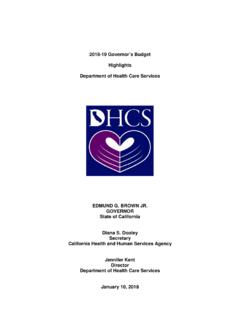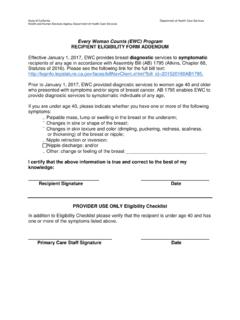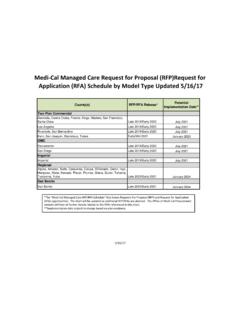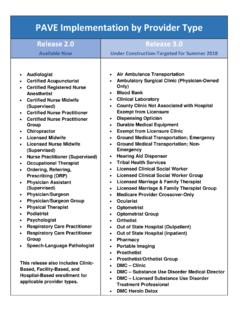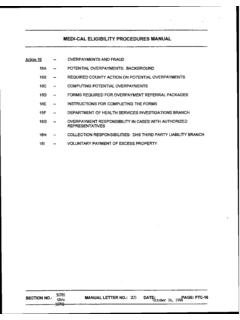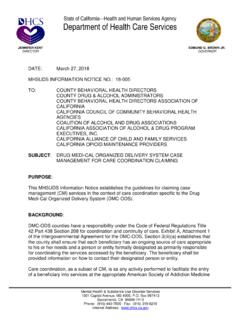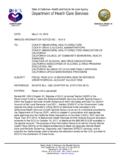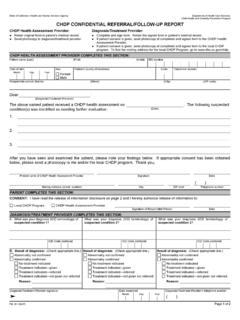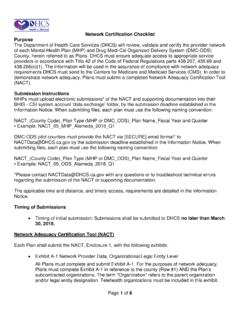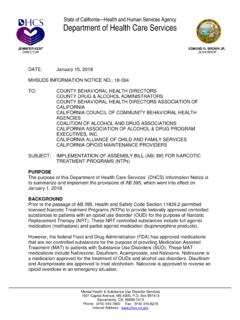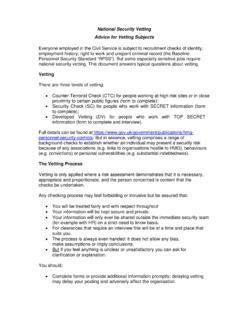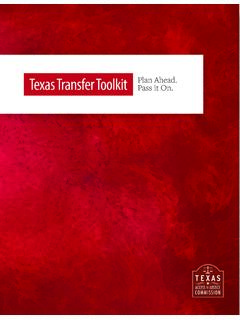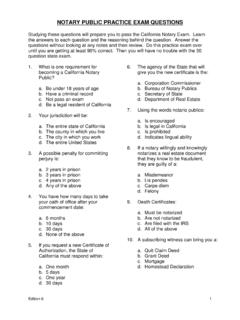Transcription of Medi-Cal General Property Limitations - California
1 State of California Health and Human Services Agency Department of Health Care ServicesMEDI-CAL General Property LIMITATIONSFOR INDIVIDUALS WHO ARE NOT ELIGIBLE USING THEIR MODIFIED ADJUSTED GROSS INCOMENote: Medi-Cal disregards Property for individuals whose eligibility is determined utilizing your Modified Adjusted Gross Income (MAGI). If you do not know if you are eligible using MAGI rules, you may ask your eligibility worker. If you have not yet applied, you may do so through your county department of health and human services or you may apply on-line at or by phone at information notice provides a General overview of Medi-Cal Property requirements for all Medi-Cal applicants and beneficiaries who are not eligible using their Modified Adjusted Gross Income.
2 Property is defined as real Property and personal Property . Real Property is land, buildings, mobile home which are taxed as real Property , life estates in real Property , mortgages, promissory notes, and deeds of trust. Personal Property is any kind of liquid or non-liquid asset, , cars, jewelry, stocks, bonds, financial institution accounts, boats, trucks, trailers, etc. Property that is not counted in determining your eligibility is called exempt or unavailable Property . Countable Property ( Property which is not exempt or unavailable) is included in the Property reserve. Your countable Property must not exceed the Property reserve limit. Any amount over the Property reserve limit will make you and/or your family ineligible for Medi-Cal .
3 To be eligible for Medi-Cal you may reduce your Property to the Property reserve limit before the end of the month in which you are requesting Medi-Cal . If you are unable to reduce your Property limit for a month beginning with the month of application, see the Exception: Principle v. Belsh section on page 3. To be eligible for Medi-Cal , your countable Property may not exceed the following Property reserve limits:Number of Persons Whose Property is ConsideredProperty Limit1$2,0002$3,0003$3,1504$3,3005$3,450 6$3,6007$3,7508$3,9009$4,05010 or more$4,200 NOTE: When there is an Institutionalized spouse with a community spouse, an additional amount of countable Property is allowed and jewelry is exempt regardless of its value. See page 2 for additional EXEMPTIONSReal PropertyPersonal Property Principal residence.
4 Property used as a home is exempt (not counted in determining eligibility for Medi-Cal ). When an applicant or beneficiary is absent from the house for any reason, including Institutionalization, the home will remain exempt if the applicant or beneficiary intends to return home someday. The home also continues to be exempt if the applicant s or beneficiary s spouse or dependent relative continues to live in it. Money received from the sale of the home can be exempt for six months if the money is going to be used for the purchase of another home. Other real Property . Up to $6,000 of the equity value in non- business real estate (excluding the home), mortgages, deeds of trust, or other promissory notes may be exempt. In order to receive this exemption, the Property must produce an annual income of 6 percent of the net market value or current face value.
5 Real Property used in a business or trade. Real estate used in a trade or business is exempt regardless of its equity and whether it produces income. One motor vehicle. Personal Property used in a trade or business. Personal affects. This includes clothing, heirlooms, weddings and engagement rings, and other jewelry with a net value of under $100. Household items. IRAs, KEOGHs, and other work-related pension plans. These funds are exempt if the family member whose name it is in does not want Medi-Cal . If held in the name of a person who wants Medi-Cal and payments of principal and interest are being received, the balance is considered unavailable and it is not counted. Irrevocable burial trusts or irrevocable prepaid burial contracts.
6 One revocable burial fund or revocable prepaid burial contract with a value of up to $1,500 plus accrued interest per person. Burial space items. Musical instruments. Recreation items including TVs, VCRs, computers, guns, collection, etc. Livestock, poultry, or crops. Countable Property equal to the amount of benefits paid under a state-certified, long-term care insurance policy. Life insurance policies. Each person may have life insurance policies with a combined face value of $1,500 or less accrued interest and dividends. MC Information Notice 007 (04/14) ENG Page 1 Property LIMITS FOR INDIVIDUALS ENTERING OR RESIDING IN LONG-TERM CAREWHO ARE NOT ELIGIBLE USING THEIR MODIFIED ADJUSTED GROSS INCOMESIf you are SINGLE and residing in a long-term care facility, you must have $2,000 or less in your Property you are MARRIED and BOTH of you live in a long-term care facility or residential care and neither of you has previously applied for Medi-Cal , your separate Property plus one-half of the community Property must be valued at $2,000 or less.
7 Your spouse not applying for Medi-Cal may keep all of his/her separate Property plus one-half of the community Property . In this situation, the spouses may be able to hasten Medi-Cal eligibility by entering into an agreement that divides their community Property . The advice of a knowledgeable attorney should be obtained prior to the signing of this type of you are MARRIED and are admitted to a long-term care and you are expected to remain for at least 30 consecutive days, and you have a spouse who is living in the community, then your community spouse may keep a certain amount of the combined community and separate Property . This amount is called the Community Spouse Resource Allowance (CSRA) and is calculated based on the day you apply for Medi-Cal .
8 Increases are effective on January 1 of each year. The CSRA for the year 2014 is $117,240. The institutionalized spouse (spouse in the long-term care facility) may keep up to an additional $2,000 of countable CSRA limit may be increased if: The community spouse obtains a court order for his/her support, or It is determined through a fair hearing that both of the following conditions exist:a. A greater amount of Property is necessary to generate income sufficient to raise the community spouse s income to the minimum monthly maintenance needs allowance (MMMNA). The MMMNA for the year 2014 is $2,931 per Additional income is necessary due to the exceptional circumstances resulting in financial : Because these rules affect how much money a community spouse may retain for purposes of the institutionalized spouse s Medi-Cal eligibility, you may want to consult a legal services program for seniors in your area or a private attorney familiar with the Medi-Cal program for more information on how the law affects institutionalized individual or his/her spouse may request an assessment of their Property even if the institutionalized individual is not applying for Medi-Cal .
9 If you would like to have an assessment completed, you must make an appointment at a county welfare department of health and human services. In order to complete the assessment, you will need to bring verification of the values of all your real and personal Property . This verification may include such things as county tax assessments, checking account statements, savings account passbooks, court orders, brokerage account statements, life insurance policies, annuity policies, trust account documents, contracts, lease agreements, life estate documents, and/or documents from qualified persons of financial institutions about the values of any real or personal Property belonging to you and your OF Property TO WITHIN Property LIMITSTHE Property RESERVE MUST BE REDUCED TO AN AMOUNT AT OR BELOW THE Property LIMIT BY THE END OF THE MONTH BEFORE Medi-Cal MAY BE APPROVED FOR THAT eligibility cannot be approved for a month unless countable Property is below the Property limit at some time during that calendar month.
10 If you are unable to reduce your Property to the Property limit for a month, beginning with the month of application, see the Exception: Principe v. Belsh section on page example: A Medi-Cal applicant whose total non-exempt Property consists of a savings account with a balance of $3,300 in a month must reduce the savings account to $2,000 in that month. In this same situation, where there is a couple, the savings must be reduced to $3,000. If an institutionalized spouse and a community spouse have combined Property totalling more than the CSRA plus $2,000 in a month, the couple will need to reduce the total non-exempt Property to at or below the CSRA plus $2,000 to meet the Property requirements.
